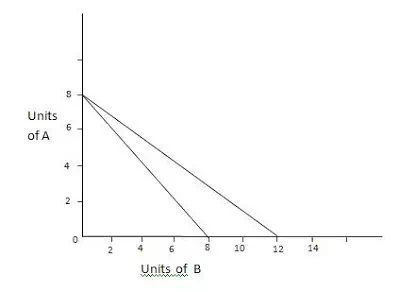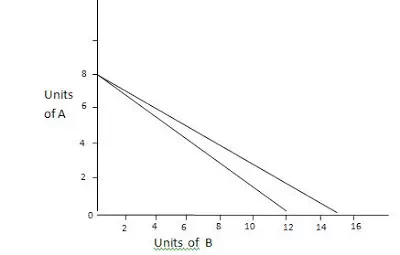A Budget Line (budget constraints)
The budget line is an important component when
analysing consumer behaviour. The budget line illustrates all the possible
combinations of two goods that can be purchased at given prices and for a given
consumer budget. The amount of a good that a person can buy will depend upon
his income and the price of the good he is purchasing.
Now suppose an individual has a total income of Rs 12 and he has to spend his
income on 2 commodities A and B. Price of A and B are Rs 1.50 and Rs. 1
respectively.
|
Units of A |
Units of B |
Total expenditure |
|
Price = 1.50 Rs |
Price = 1 Rs |
( in Rupees) |
|
8 |
0 |
12 |
|
6 |
3 |
12 |
|
4 |
6 |
12 |
|
2 |
9 |
12 |
|
0 |
12 |
12 |
And the above table can be portrayed in the form of graph like

· With a limited income of 12 Rs, The individual can buy either of the given combinations of two commodities A and B.
· Any Point within the triangle is attainable by the consumer.
· Any point outside the triangle can not be bought by the consumer with his limited income.
At U,we have 7 units of A + 3 units of B; it would total cost 13.50 Rs.. So, this is unattainable
So, we got to know that With a limited budget the consumer can only consume a limited combination of A and B (the maximum combinations are on the actual budget line). Consumer can buy more products with the increase in his income or decrease in the prices.
A change in consumer income and the budget line
If consumer income increases then the consumer will be able to purchase higher
combinations of goods. Hence an increase in consumer income will result in a
shift in the budget line. the prices of the two goods have remained the same,
therefore, the increase in income will result in a parallel shift in the budget
line.
Assume consumer income increased to Rs 15.So, now he can buy more quantities of
both goods.
Increase in income

An Increase in income makes the purchase of more of either one or both items
possible.
If consumer income falls then there would be a corresponding parallel shift to
the left to represent a fall in the potential combinations of the two goods
that can be purchased. Now, suppose the consumer income falls to RS. 9.
Fall in Income

An decrease in income makes the purchase of less of either one or both items possible.
A change in the price of a good and the budget line
If income is held constant, and the price of one of the goods changes then the
slope of the curve will change. If the price of one of the commodity increases,
the budget line will move inwards and vice versa.
Increase in price of one commodity
If the price of one of the commodity increases, the budget line will move
inwards

Here, the price of commodity B had increased and with the increase in price,
the curve has moved inwards. Lets see the points on x axis only, when we are
not buying any units of A. Earlier with Rs 12 and price of B, Rs 1, he was able
to buy 12 units of B. With the increace in price of B from 1 to 1.50 Rs, Now he
can can buy 8 units of B only
Decrease in price of one commodity
If the price of one of the commodity decreases, the budget line will move
outwards

Here, the price of commodity B had decreased and with the decrease in price,
the curve has moved outwards. Lets see the points on x axis only, when we are
not buying any units of A. Earlier with Rs 12 and price of B, Rs 1, he was able
to buy 12 units of B. With the decrease in price of B from 1 to 0.80 Rs, Now he
can can buy 15 units of B.